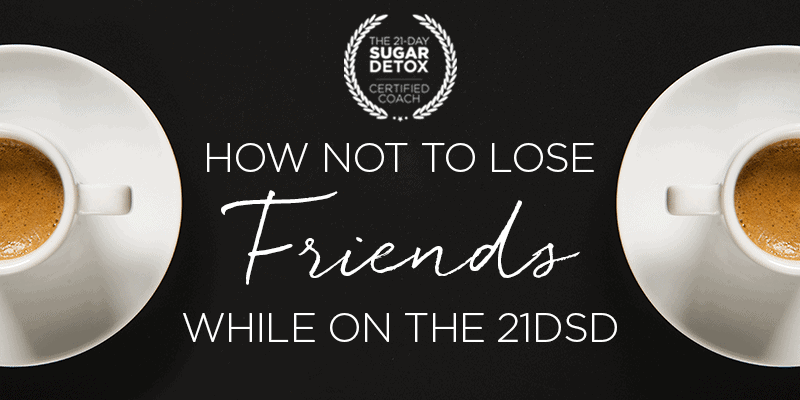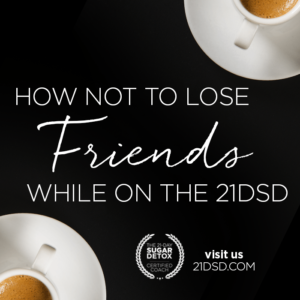Hey Folks! We're excited to introduce Certified 21DSD Coach Michal Ofer. Michal's article is part of a series of articles contributed by our Certified 21DSD Coaches. Enjoy! – Diane and Team
When embarking on a new eating plan or a program like the 21DSD, all the hinderers and saboteurs in your life seem to come out of the woodwork! Social pressure can heat up really fast if you have taken on changing your life in a way that is very different from those in your life – your family, friends and co-workers. They may not be thrilled with your lifestyle changes and can present a lot of discouragement, even if they are well meaning.
“You don’t like the food I made?”
“A little bite won’t hurt you.”
“There is no reason to give up wheat/gluten, it’s good for you.”
These statements and questions are all sadly familiar when beginning the end of your relationship with sugar.
You do not have to make a choice between your commitment to the 21DSD and your social life. With a few simple tips and strategies you can give up the sugars, refined grains and processed foods that are negatively impacting your life and not live on a deserted island while doing so.
In an ideal world, everyone you know would be doing the 21DSD with you. They would all be determined to kick the sugar habit and embark on their healthier life. You would all encourage each other and get through it together. In reality, this is not the case.
Sticking to the 21DSD if you are able to eat every meal alone is probably unrealistic and as such a large portion of socializing involves eating and drinking. This is further confounded when the people you are socializing with knew you before you decided to change your relationship with food. It is important to equip yourself with a few skills to navigate the family dinner or happy hour with friends – unless spending your 21 days alone seems appealing to you!
Here are my suggestions and ground rules you can use and adapt to avoid allowing all that social pressure to get to you and sabotage your best efforts.
In order to get some support from those in social situations, you need to be an advocate for yourself. It is important to take your commitment to your 21DSD seriously. If you keep undermining yourself (with a bite here and a slip there), you will be less likely to be taken seriously. Be clear about your guidelines and what you can, and cannot, tolerate.
-
No need to create a huge fuss
Not making a big deal about the foods you are eliminating and avoiding will often times allow you to go about your 21DSD whilst drawing minimal attention to your new dietary habits.
We are all well aware of the feelings we have towards the person who always creates drama around what they can and cannot eat, having ethical or philosophical discussions around it and implying we are all wrong and sinful for not following their nutritional ideology. This can be highly annoying and a good lesson in what not to do.
Be polite, say no-thank-you, and continue with your social function.
Not making a big deal out of what people you care about are eating may be a little tougher.
-
Converting others is not your goal
You have all this newly acquired information about sugar, where it’s hiding and what it’s doing to the body. You want to tell everyone. This is important stuff, and if they knew, they would join you on this detox.
No matter how pure your intentions, your enthusiasm is easy for others to misinterpret as you being judgmental or condescending. Food is extremely personal and such a delicate topic. Discussing your new choices may cause someone else to get really defensive.
The best and easiest solution is to lead by example. When you make the right choices and start feeling and seeing your positive results, some people will become curious and ask how you look better, feel better, have more energy, and seem happier.
-
Explain your choices briefly and concisely
Defending your new food choices or limitations can create much social anxiety. For situations like this, a short, one- or two-sentence explanation is all that is necessary. Keep it memorable and practice it so that you can say it with confidence. You have a right to your choice, so explain and move on.
An example could be:
‘I am not eating (insert food here – gluten, grains, wheat, legumes, dairy, fruit, etc.) as right now this is what works best for my health’
If a person will not let it go and keeps insisting on further engagement around the subject, repeating ‘it works best for my health’ is often a tough statement to argue with.
-
Become a planner
You can plan social events to get together with others that do not involve food and alcohol. Take a walk, meet at a coffee shop, play a game of mini-golf or anything else that you rarely do as so many social activities revolve around food.
Inviting family and friends over for dinner is another sure-fire way to avoid awkward situations when refusing a dish, and it will allow you the opportunity to show off some of the delicious 21DSD recipes you have mastered.
-
Assumptions are over-rated
Pre-judging the reaction of others and assuming they will respond negatively to your passing on the bread basket are not constructive. Your friends, colleagues and loved ones will often surprise you with support and positive feedback. You may be surprised by who is supportive and who is resistant and how many around you are truly in your corner.
Walking into a situation assuming all reactions will be negative can also leave you feeling defensive and create a negative outcome before it has even occurred.
-
You have a choice
I know that eliminating social pressure completely is unrealistic, but you can choose to avoid many situations where that pressure negatively impacts you. In exchange, you can choose situations and individuals to surround yourself with who can both support you and keep you accountable to your 21DSD.
This type of positive social pressure makes you more likely to stick to your commitment, even when you are having a tough day. Communities of like-minded people, in person or online, will also provide positive examples and reinforcement of your health goals.
Patience is important. One of the hardest parts of embarking on your 21DSD is getting you, and everyone else accustomed to your new (and possibly strange) food choices.
Unfortunately, it is unrealistic to expect to win everyone over. There will always be that one person insistent on trying to derail your new lifestyle choices. They will never be part of Team 21DSD, and that is perfectly fine.
The focus should always be on what you are able to control – you and your commitment to your health. You may want to limit your interactions with those who are excessively critical or judgemental – your health is always worth it. Dealing with social pressure need not be over-complicated. You can keep your friends and successfully complete your 21DSD.
 Michal Ofer is a certified life coach, health coach and 21DSD coach. She has always had a love for food, cooking and all things nutrition related. Michal grew up in South Africa where she studied biological sciences and got her degree in Optometry with a minor in holistic nutrition. After some travelling, disguised as learning overseas, Michal immigrated to Canada where she worked in business development and team building. A less than positive experience with the current acute care medical system and ‘Standard American (Canadian) Diet’ whilst trying to overcome a chronic health issue, led Michal on a path to discovering that food truly is our best medicine and that all healing begins in the gut. Once recovered, Michal wanted to help others reach their optimal level of health, wellness and vitality that a real food approach to diet gives. Michal is a nutritional consultant working with individuals looking to improve their general well-being, with a special emphasis on naturally and holistically healing the damage that disordered eating creates in the entire digestive system. When not counselling others or trying to keep up to date with the online world, Michal is an amateur cook, testing her newest food creations on brave volunteers. She can be reached at [email protected] for further insight into moving beyond eating disorders.
Michal Ofer is a certified life coach, health coach and 21DSD coach. She has always had a love for food, cooking and all things nutrition related. Michal grew up in South Africa where she studied biological sciences and got her degree in Optometry with a minor in holistic nutrition. After some travelling, disguised as learning overseas, Michal immigrated to Canada where she worked in business development and team building. A less than positive experience with the current acute care medical system and ‘Standard American (Canadian) Diet’ whilst trying to overcome a chronic health issue, led Michal on a path to discovering that food truly is our best medicine and that all healing begins in the gut. Once recovered, Michal wanted to help others reach their optimal level of health, wellness and vitality that a real food approach to diet gives. Michal is a nutritional consultant working with individuals looking to improve their general well-being, with a special emphasis on naturally and holistically healing the damage that disordered eating creates in the entire digestive system. When not counselling others or trying to keep up to date with the online world, Michal is an amateur cook, testing her newest food creations on brave volunteers. She can be reached at [email protected] for further insight into moving beyond eating disorders.


